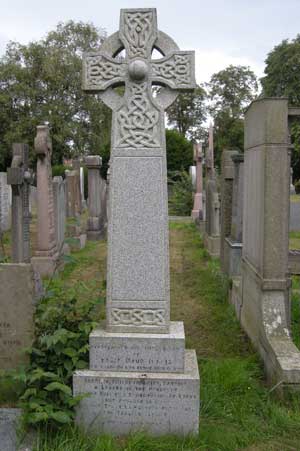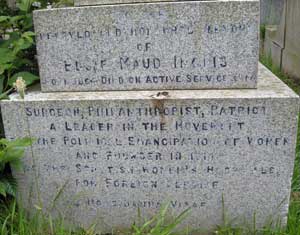Elsie Maud Inglis
Born 1864 Died 1917
Research by Kate Neilson
"Surgeon, Philanthropist, Patriot"
Who is Elsie Inglis?

Elsie Inglis (image out of copyright)
Elsie was born in Naini Tal, India , where her father worked in the Indian Civil Service. Following his early retirement the family settled in Edinburgh in 1878. After a private education Elsie decided to study medicine and was one of the first pupils to study at Dr. Sophia Jex Blake's Edinburgh School of Medicine for Women. However she did not agree with Jex-Blake's overbearing manner and in 1887 she set up her own breakaway medical college at 30 Chamber's Street, Edinburgh. She attended Edinburgh University where she graduated in medicine and also gained the Licentiateship of the Royal College of Physicians and Surgeons, Edinburgh and the Faculty of Physicians and Surgeons of Glasgow. She obtained a post as surgeon at Elizabeth Garrett Anderson's pioneering New Hospital for Women in London, and then at the Rotunda, a leading maternity hospital in Dublin.
She returned to Edinburgh in 1894 where she set up a medical practice with Jessie MacGregor, who had been a fellow student. Deeply concerned at the lack of provision of maternity facilities and healthcare for women, she founded a maternity hospital alongside a midwifery resource centre, staffed entirely by women, in Edinburgh in 1901 (The Hospice), which was a forerunner of the Elsie Inglis Memorial Hospital.
Her work experience of the standard of medical care available to women and the dismal living conditions of working class women led to her becoming politically active and playing a prominent role in the women's suffrage movement. As honorary secretary of the committee of the Edinburgh National Society for Women's Suffrage she became involved in organising and supervising processions, demonstrations and speakers; and when the Scottish Federation of Women's Suffrage Societies (SFWSS) was formed under the umbrella of the National Union of Women's Suffrage Societies, she became honorary secretary of that too.
When the First World War broke out in 1914 she offered her services but these were rejected by the British War Office. Undeterred she proposed the formation of the Scottish Women's Hospitals for Foreign Service committee which was funded by the SFWSS to provide all - female staffed relief hospitals for the Allied war effort. Teams were sent to France, Serbia and Russia. She accompanied the teams sent to Serbia where her dedication, high standards and good practice greatly reduced the raging typhoid and other epidemics. In 1915 she was captured and repatriated but upon reaching home she began organising funds for a Scottish Women's Hospitals Unit in Russia. She headed the team when it left for Odessa, Russia in 1916 but lasted only a year before she was evacuated in 1917, suffering from cancer.
She died in Newcastle on 26 November 1917. Her body lay in state at St Giles Cathedral and the funeral service on 29th November was "the occasion of an impressive public tribute," (The Scotsman).
She was the first woman to be awarded the Order of the White Eagle, the highest honour given by Serbia
At a memorial service in Westminster Winston Churchill said of Dr. Inglis and her nurses, ".....they will shine in history."
She is buried in the Dean Cemetery.
Sources:
Books:
E.Ewan,S.Innes,S.Reynolds (ed) The Biographical Dictionary of Scottish Women (2006)
Leah Leneman, The Scottish Suffragettes (2000)
Leah Leneman, Elsie Inglis : Founder of battlefront hospitals run entirely by women (1998)
On-line:
Wikipedia.


Elsie's gravestone (and detail) in Dean Cemetery.